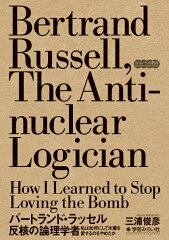バートランド・ラッセル『常識と核戦争』付録1:矛盾か?
* 出典:バートランド・ラッセル(著),飯島宗亨(訳)『常識と核戦争-原水爆戦争はいかにして防ぐか』(理想社,1959年5月. 138pp.)* 原著:Common Sense and Nuclear Warfare, 1959, by Bertrand Russell
|
|
Common Sense and Nuclear Warfare,1959, Appendex 1: Inconssitency? | |||
アメリカだけが原子爆弾を所有しており,すべての原子力利用を国際管理とすることを意図したバルーク案(注:1946年6月14日に米国が国連原子力委員会に提出した案)として知られているものをアメリカ政府が提唱していた時期に,私はその提案を賢明かつ寛大であると考えました。バルーク計画が採用されれば,西側世界の全ての事情のわかった人々にとってそのおそるべき危険性が明らかである,原子兵器(軍備)競争を阻止するであろう,と考えました。しばらくは,ソビエト連邦がこの計画に同意することが可能と思われました。ロシアは,同意することによって得るものこそあれ失うものはなにもないと考えたからです。不幸なことに,スターリンの猜疑心の強い性格は,何か罠があるのではないかと彼に思わせ,ロシアは自国自身の原子兵器を製造する決意をしました。その当時,私は,原子兵器の国際管理の問題ただひとつだけで,ロシアに圧力をかけて,必要とあれば戦争に訴えると脅すことさえも,やるだけの価値はあるだろう,と考えました。現在と同じく当時もく,私の意図は,東西両陣営がともに全世界的なひろがりのある大惨事を生み出す力を有する戦争を阻止することでした。けれども,西側の政治家たちは,西側の東側に対する想像上の(推定上の)技術的優越性を確信し,ロシアが核戦争の分野で非共産主義世界と同等のものを成就する危険性はまったくないと信じこんでいました。この点での彼らの確信は,間違っていたということがわかりました。その結果は,もし核戦争がいま阻止されるべきであるならば,新しい方法によってなされなければならず,それは10年前なら使用することが可能であった方法によってではない,ということです。 私を批判する人々は,一度ある政策を唱えたら,事情がすっかり変ってしまった後においても,その政策を唱え続けるべきだ,と考えているようです。これは,まったくばかげています。ある目的地に行こうと思って汽車(注:今なら電車)に乗った人が,途中で汽車が故障した場合,汽車から下りて,目的地に行きつくために別の乗物を用いたからといって,その人は一貫性のなさ(矛盾)という誤りをおかしたなどとは,あなたも考えないでしょう。同様に,ある一定の事情においてある一定の政策を唱える人物は,異なった事情においてはまったく異なった政策を唱えることでしょう。 |
Opponents of my recent activities in the campaign against H-bomb warfare have brought up what they consider to be an inconsistency on my part and have used statements that I made ten years ago to impair the force of the statements that I have made more recently. I should like to clear up this matter once for all. At a time when America alone possessed the atom bomb and when the American Government was advocating what was known as the Baruch Proposal, the aim of which was to internationalize all the uses of atomic energy, I thought the American proposal both wise and generous. It seemed to me that the Baruch scheme, if adopted, would prevent an atomic arms race, the appalling dangers of which were evident to all informed opinion in the Western World. For a time it seemed possible that the USSR would agree to this scheme, since Russia had everything to gain by agreeing and nothing to lose. Unfortunately, Stalin's suspicious nature made him think that there was some trap, and Russia decided to produce her own atomic weapons. I thought, at that time, that it would be worth while to bring pressure to bear upon Russia and even, if necessary, to go so far as to threaten war on the sole issue of the internationalizing of atomic weapons. My aim, then as now, was to prevent a war in which both sides possessed the power of producing world-wide disaster. Western statesmen, however, confident of the supposed technical superiority of the West, believed that there was no danger of Russia achieving equality with the non-Communist world in the field of nuclear warfare. Their confidence in this respect has turned out to have been mistaken. It follows that, if nuclear war is now to be prevented, it must be by new methods and not by those which could have been employed ten years ago. My critics seem to think that, if you have once advocated a certain policy, you should continue to advocate it after all the circumstances have changed. This is quite absurd. If a man gets into a train with a view to reaching a certain destination and on the way the train breaks down, you will not consider the man guilty of an inconsistency if he gets out of the train and employs other means of reaching his destination. In like manner, a person who advocates a certain policy in certain circumstances will advocate a quite different policy in different circumstances. |


